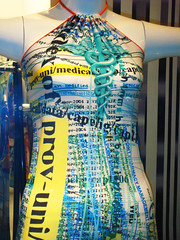Open Data and Personal Data Project Coordinator
Katelyn Rogers - December 13, 2013 in Uncategorized
Open Data and Personal Data Project Coordinator
We are looking to recruit a Project Coordinator to coordinate and undertake activities to explore issues around open data and privacy regarding personal information, as part of a joint project between the Open Knowledge Foundation and the Open Rights Group.
This is a part time fixed term contract role, at 0.6-0.7FTE from January-September 2014.
About the project
There is growing awareness of the importance of issues arising at the intersection of open data and privacy. Many of the most interesting questions and problems we have involve personal data of some kind. Programmes that are promoting open data and transparency might further increase the potential conflicts with privacy. These have generally been avoided by focusing on data not connected to individuals, such as maps and budgets. However, increasingly there is information which could be valuable to transparency and accountability work which may have a personal component – for example, data on provision and performance of public and social services – schools, hospitals, welfare, employment, etc. Besides the general concerns on a governmental or organisational level, the question of control from the personal perspective becomes much more important: how can I find out who owns data about me, who controls it, who has access to it? Can I see data about me, can I get a copy of it in a form I could reuse or share, can I get value out of it? Would I even be allowed to publish openly some of the data about me, if I wanted to?
This project will explore issues of the right to choose what happens with personal information, transformations of personal data to open data, and the ability to open up personal information by choice.
About the role
This role will take the lead on project activities including: researching the current environment, identifying key issues, engaging with other organisations and groups, and where appropriate commissioning blog posts and tutorial or other material. For example, anonymisation of data is extremely hard, and although not a new problem, it gets more challenging as more data is available, openly or otherwise. We plan to distill key elements from this work into materials reusable by others, for example as an additional section of the Open Data Handbook or the Open Research Handbook.
Furthermore, we will work to bring together key individuals and experts in the area both on a policy and on a grassroots level, as well as to organise a workshop ourselves. The aim of this is to bring together key communities (in privacy, in personal data management, in open data) and identify gaps and issues in understanding and best practice. This will lead to development of a roadmap and action plan to drive forward activity in this area, in collaboration with the working group and key experts and stakeholders.
In particular this will include:
- Working with key stakeholders to design and coordinate activities to explore issues around privacy and open data, including expert workshop organisation and delivery
- Helping to maintain a pool of information on this topic for public use and reference
- Building and coordinating the Open Data and Personal Data Working Group, an interdisciplinary community, primarily online including posting on, and soliciting guest posts from key projects and individuals on the project blog, facilitating mailing list discussions, and community mapping
- Reaching out to and involving key privacy and open data organisations in the conversations and thought developments, and other key individuals in this space, and connecting with relevant projects
- Facilitating the creation of community-driven materials on this topic – which may be principles, educational curricula, or handbooks/toolkits
- Synthesising community and expert group input into output documents including a roadmap
- Leading efforts to disseminate information about the project amongst relevant stakeholders – including developers, developers, educational institutions, NGOs, SMEs, end users in government and business, and the general public
- Furthermore, the coordinator will attend relevant events in this area to further build the network around open data and privacy, reporting on those via the working group’s communication channels.
Person specification
We are looking for someone highly articulate, enthusiastic and energetic who is willing to travel to events. We are expecting the successful candidate to be familiar with email, blogs and Twitter, and comfortable with using (or learning to use) a variety of web-based platforms and services. No specific technical knowledge is required but an awareness of personal and/or open data issues would be helpful. Most important is the ability to translate concepts between communities including technical expert groups, to facilitate discussion and debate, and to clearly capture and convey concepts in writing. Being able to learn quickly, converse intelligently and advocate convincingly are much more important than any detailed background knowledge about open data, personal data or privacy.
The ideal candidate should:
- be a self-starter – capable of working independently and coordinating with colleagues remotely.
- be highly organised – capable of managing their own projects and initiatives, as well as coordinating with and chasing up others where relevant.
- have excellent written and spoken English
- have strong interpersonal skills; ability to work with and communicate effectively and engagingly with a wide range of specialists, academics, software developers, researchers and others
- be comfortable with public speaking, coordinating group activities and communicating on behalf of the Open Knowledge Foundation in various public fora (including emails, on the web and at events).
- be technically literate – comfortable with using (or learning to use) a variety of web based platforms and services (e.g. Google Docs, WordPress, Dropbox, Skype).
Location
We will consider applicants based anywhere in the world, however if you are within easy reach one of our hubs in London or Cambridge, that may be preferred.
Pay
Negotiable rate based on experience.
How to apply
If you’d like to apply, please email jobs@okfn.org with the subject line “Project Coordinator (Open Data and Privacy)” before 2nd January 2014 . Include your CV and a letter describing why you would be great in this role, highlighting relevant experience.
– See more at: https://okfn.org/jobs/#pc
 Personal Data and Privacy Working Group
Personal Data and Privacy Working Group 

